While praying through the readings for today the last couple lines stood out to me. “When Jesus finished these words, the crowds were astonished at his teaching, for he taught them as one having authority, and not as their scribes.” At first I had no idea why this specific line would keep coming to my attention, but as I reflected more I realized that we have all been given authority by God. The question is, do we use that authority to preach the Good News.
All of us at our baptism were baptized into the offices of priest, prophet, and king. Though these roles may look slightly different for all of us depending on our stages in life, we all have them. It is interesting to hear in the Gospel that the scribes had forgotten any authority they had or at least were not putting it into practice. Maybe sometimes we struggle with that same problem. Often we can think of baptism just as the sacrament that forgives our sins and opens salvation, but it is much more than that.
Baptism makes us part of a family and within that family we have certain responsibilities and authority. Now you might be asking yourself what the priesthood role has to do with you if you are not a priest? Or how does a king apply to me? Aren’t kings just an old-school method of governance?
Well let’s break these down one at a time. First, a priest’s role is to make the commonplace holy. This is what he does during every Mass with the bread and wine. Although we are not going to be consecrating the Eucharist, we should be asking ourselves how we can make the commonplace holy in our day to day lives. How can we bless the people God has given us to care for?
Second, a prophet is one who has faith that what God says is true and then communicates that message to others. We can do the same thing. We can have that same amount of faith to trust God with our whole lives and then invite people into that beautiful mystery by proclaiming the Good News.
Finally, a king is one who has power over their domain. For many of us our domain might be our family. It might be various relationships we have in our lives. Or it might even be our own body. A good ruler is one who takes care of his kingdom. Our body is a temple of the Holy Spirit that we have been given to take care of. Are we acting like a good king and making sure we are taking care of our “kingdom” or are we stuffing our temple with garbage in our words, thoughts, and actions?
I think all of us can benefit from taking a moment today to reflect inwardly and see how we can use the offices of our baptism to better serve the Church.
From all of us here at Diocesan, God bless!
Mientras rezaba con las lecturas de hoy, me llamaron la atención las últimas dos líneas: “Cuando Jesús terminó de hablar, la gente quedó asombrada de su doctrina, porque les enseñaba como quien tiene autoridad y no como los escribas”. Al principio no tenía idea de por qué esta línea específica me seguía llamando la atención, pero al reflexionar más me di cuenta de que Dios nos ha otorgado autoridad a todos. La pregunta es: ¿utilizamos esa autoridad para predicar la Buena Nueva?
Todos nosotros, en nuestro bautismo, fuimos bautizados en los oficios de sacerdote, profeta y rey. Aunque estos roles pueden parecer un poco diferentes para cada uno de nosotros según nuestras etapas de la vida, todos los tenemos. Es interesante escuchar en el Evangelio que los escribas se habían olvidado de cualquier autoridad que tuvieran o al menos no la estaban poniendo en práctica. Quizás a veces batallamos con ese mismo problema. A menudo podemos pensar en el bautismo simplemente como el sacramento que perdona nuestros pecados y abre la salvación, pero es mucho más que eso.
El bautismo nos hace parte de una familia y dentro de esa familia tenemos ciertas responsabilidades y autoridad. Ahora bien, puede que te preguntes qué tiene que ver contigo el papel del sacerdocio si no eres sacerdote. ¿O cómo se aplica un rey a mí? ¿No son los reyes simplemente un método antiguo de gobierno?
Bueno, analicemos estos puntos uno por uno. En primer lugar, el papel de un sacerdote es santificar lo cotidiano. Esto es lo que hace durante cada misa con el pan y el vino. Aunque no vamos a consagrar la Eucaristía, deberíamos preguntarnos cómo podemos santificar lo cotidiano en nuestra vida diaria. ¿Cómo podemos bendecir a las personas que Dios nos ha dado para cuidar?
En segundo lugar, un profeta es alguien que tiene fe en que lo que Dios dice es verdad y luego comunica ese mensaje a los demás. Nosotros podemos hacer lo mismo. Podemos tener la misma cantidad de fe para confiarle a Dios toda nuestra vida y luego invitar a las personas a ese hermoso misterio proclamando la Buena Nueva.
Finalmente, un rey es alguien que tiene poder sobre su reino. Para muchos de nosotros, nuestro reino puede ser la familia, las diversas relaciones que tenemos en la vida o incluso nuestro propio cuerpo. Un buen gobernante es aquel que cuida de su reino. Nuestro cuerpo es un templo del Espíritu Santo que se nos ha dado para que cuidemos. ¿Estamos actuando como un buen rey y nos aseguramos de cuidar nuestro “reino” o estamos llenando nuestro templo de basura con nuestras palabras, pensamientos y acciones?
Creo que todos podemos beneficiarnos de tomarnos un momento hoy para reflexionar interiormente y ver cómo podemos utilizar los oficios del bautismo para servir mejor a la Iglesia.
De parte de todos nosotros aquí en Diocesan, ¡Dios los bendiga!

Tommy Shultz is a Business Development Representative for Diocesan. In this role he is committed to bringing the best software to dioceses and parishes while helping them evangelize on the digital continent. Tommy has worked in various diocese and parish roles since his graduation from Franciscan University with a Theology degree. He hopes to use his skills in evangelization, marketing, and communications, to serve the Church and bring the Good News to all. His favorite quote comes from St. John Paul II, who said, “A person is an entity of a sort to which the only proper and adequate way to relate is love.”
Feature Image Credit: Josh Applegate, unsplash.com/photos/toddler-baptized-mjn1LcoU1Cw
The views and opinions expressed in the Inspiration Daily blog are solely those of the original authors and contributors. These views and opinions do not necessarily represent those of Diocesan, the Diocesan staff, or other contributors to this blog.
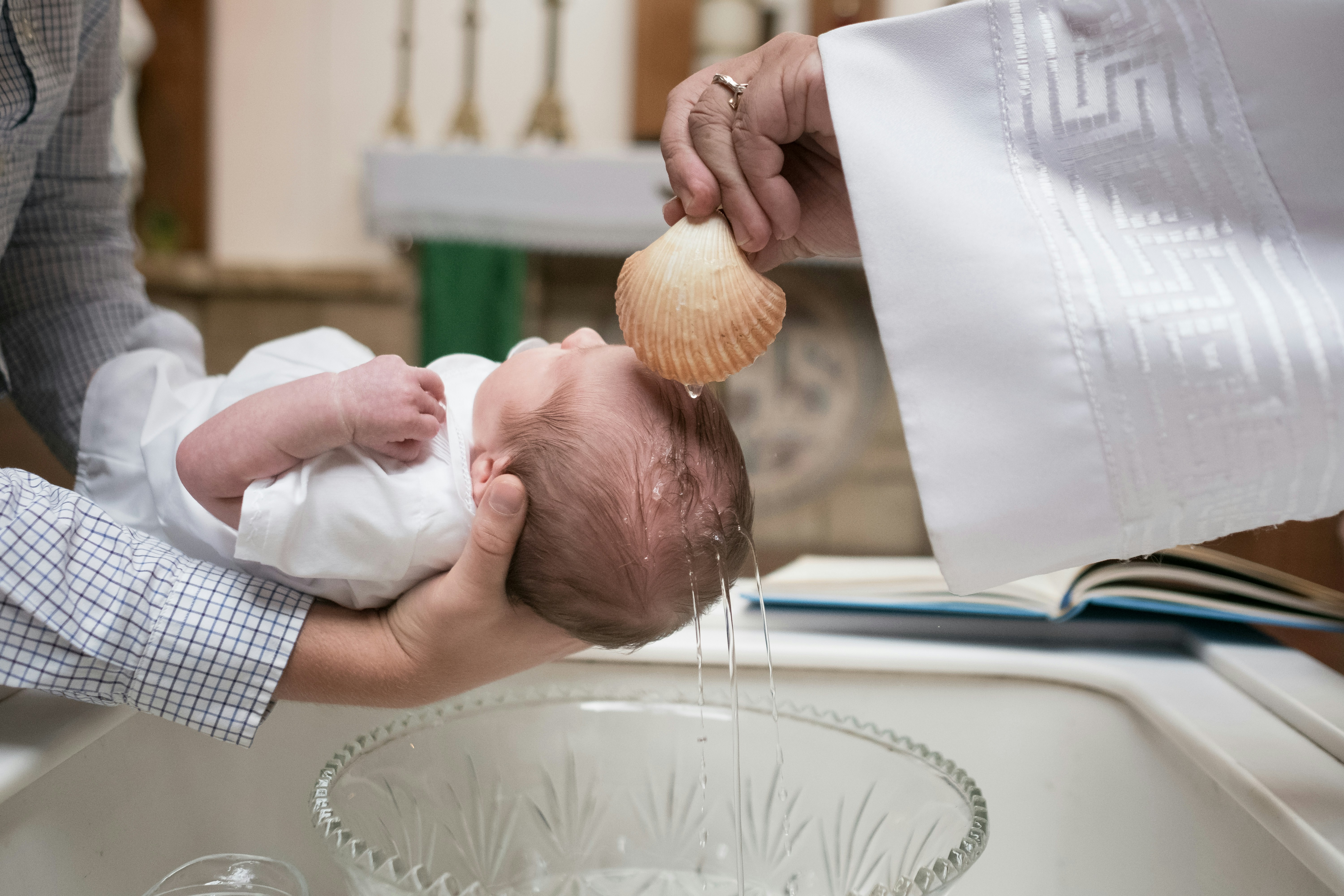

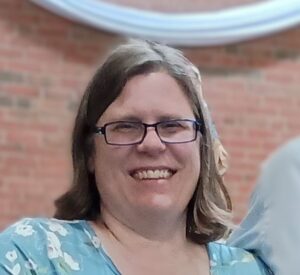 Tami Urcia is a midwestern gal from a large Catholic family. As a young adulthood she was a missionary in Mexico, where she studied theology and philosophy. After returning stateside bilingual, she gained a variety of work experience, traveled extensively and finished her Bachelor’s Degree at Brescia University. She loves organizing and simplifying things, watching her children play sports, deep conversations with close family and friends and finding unique ways to brighten others’ day with Christ’s love. She works full time at Diocesan in the Software Department and manages the Inspiration Daily reflections. She is also a contributing writer on
Tami Urcia is a midwestern gal from a large Catholic family. As a young adulthood she was a missionary in Mexico, where she studied theology and philosophy. After returning stateside bilingual, she gained a variety of work experience, traveled extensively and finished her Bachelor’s Degree at Brescia University. She loves organizing and simplifying things, watching her children play sports, deep conversations with close family and friends and finding unique ways to brighten others’ day with Christ’s love. She works full time at Diocesan in the Software Department and manages the Inspiration Daily reflections. She is also a contributing writer on 
 Lily is a Michigan native and cradle Catholic who has spent most of her life exploring her own reasons to embrace her faith fully. She attended Franciscan University of Steubenville, where she discovered the beauty of her personal relationship with Christ and the Church. After college, she worked in Montessori Education for three years and recently transitioned to nannying. She was recently married and spends most of her time reading, and enjoying her dog and family!
Lily is a Michigan native and cradle Catholic who has spent most of her life exploring her own reasons to embrace her faith fully. She attended Franciscan University of Steubenville, where she discovered the beauty of her personal relationship with Christ and the Church. After college, she worked in Montessori Education for three years and recently transitioned to nannying. She was recently married and spends most of her time reading, and enjoying her dog and family!
 Kate Taliaferro is an Air Force wife and mother. She is blessed to be able to homeschool, bake bread and fold endless piles of laundry. When not planning a school day, writing a blog post or cooking pasta, Kate can be found curled up with a book or working with some kind of fiber craft. Kate blogs at
Kate Taliaferro is an Air Force wife and mother. She is blessed to be able to homeschool, bake bread and fold endless piles of laundry. When not planning a school day, writing a blog post or cooking pasta, Kate can be found curled up with a book or working with some kind of fiber craft. Kate blogs at 
 Merridith Frediani loves words and is delighted by good sentences. She also loves Lake Michigan, dahlias, the first sip of hot coffee in the morning, millennials, and playing Sheepshead with her husband and three kids. She writes for Catholic Mom, Diocesan.com, and her local Catholic Herald. Her first book Draw Close to Jesus: A Woman’s Guide to Adoration is available at Our Sunday Visitor and Amazon. You can learn more at
Merridith Frediani loves words and is delighted by good sentences. She also loves Lake Michigan, dahlias, the first sip of hot coffee in the morning, millennials, and playing Sheepshead with her husband and three kids. She writes for Catholic Mom, Diocesan.com, and her local Catholic Herald. Her first book Draw Close to Jesus: A Woman’s Guide to Adoration is available at Our Sunday Visitor and Amazon. You can learn more at 
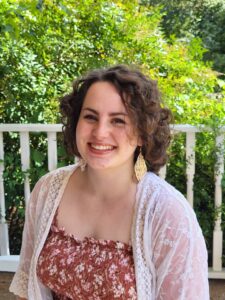 Hailing from Nashville, Catherine is a graduate of Christendom College with a lifelong passion for words. Her love of writing and her Catholic Faith continue to shape her as a freelance editor, copywriter, and (aspiring) novelist, where she pursues her passions for the love and greater glory of God.
Hailing from Nashville, Catherine is a graduate of Christendom College with a lifelong passion for words. Her love of writing and her Catholic Faith continue to shape her as a freelance editor, copywriter, and (aspiring) novelist, where she pursues her passions for the love and greater glory of God.
 Pamela Kavanaugh is a grateful wife, mother, and grandmother who has dedicated her professional life to Catholic education. Though she has done her very best to teach her students well in the subjects of language and religion, she knows that she has learned more than she has taught. She lives, teaches, and writes in southwest suburban Chicago.
Pamela Kavanaugh is a grateful wife, mother, and grandmother who has dedicated her professional life to Catholic education. Though she has done her very best to teach her students well in the subjects of language and religion, she knows that she has learned more than she has taught. She lives, teaches, and writes in southwest suburban Chicago.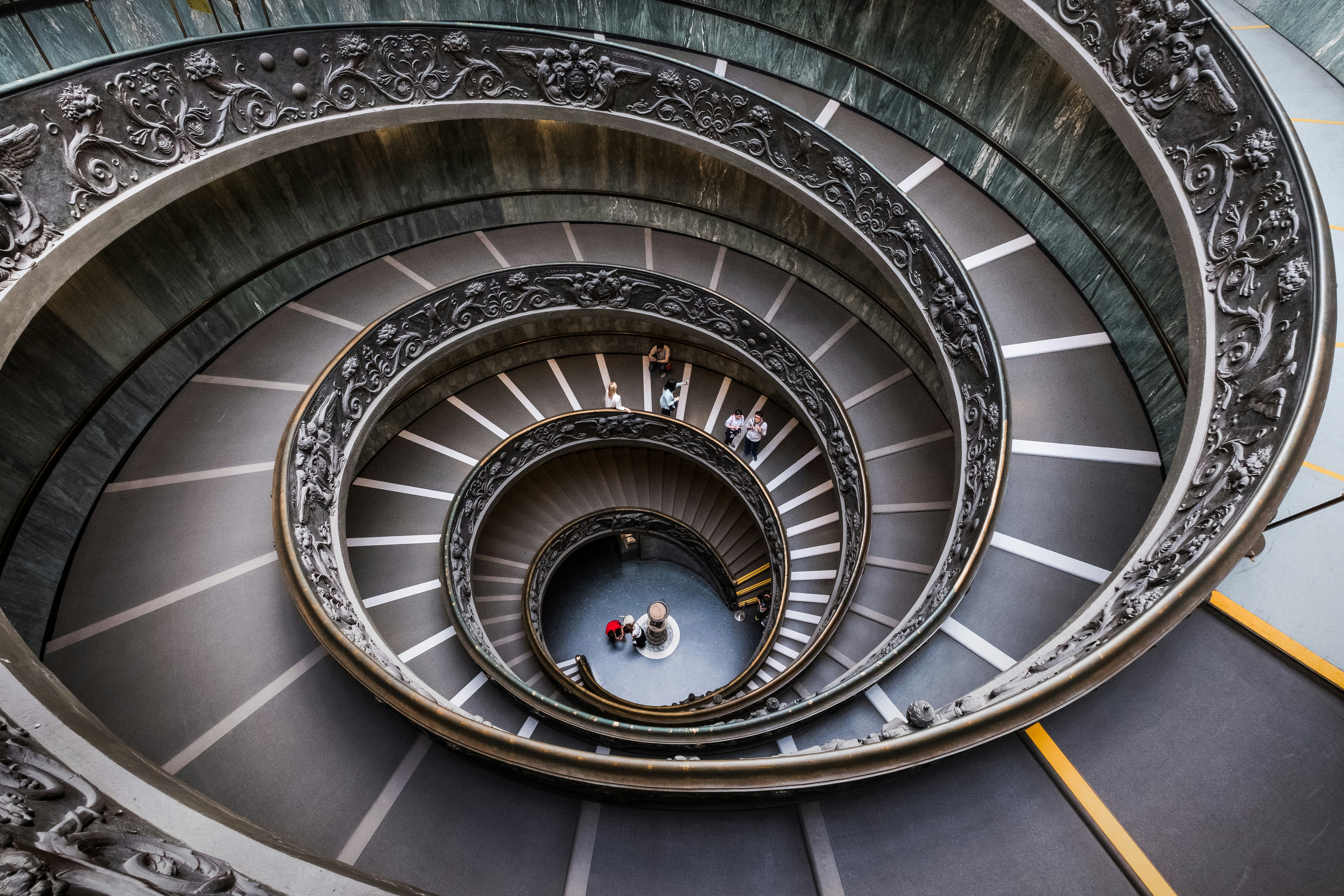
 Deanna G. Bartalini, M.Ed.; M.P.A., is a certified spiritual director, writer, speaker and content creator. The
Deanna G. Bartalini, M.Ed.; M.P.A., is a certified spiritual director, writer, speaker and content creator. The 
 Mike Karpus is a regular guy. He grew up in Michigan’s Upper Peninsula, graduated from Michigan State University and works as an editor. He is married to a Catholic school principal, raised two daughters who became Catholic school teachers at points in their careers, and now relishes his two grandchildren, including the older one who is fascinated with learning about his faith. He also has served on a Catholic school board, a pastoral council and a parish stewardship committee. He currently is a lector at Mass, a Knight of Columbus, Adult Faith Formation Committee member and a board member of the local Habitat for Humanity organization. But mostly he’s a regular guy.
Mike Karpus is a regular guy. He grew up in Michigan’s Upper Peninsula, graduated from Michigan State University and works as an editor. He is married to a Catholic school principal, raised two daughters who became Catholic school teachers at points in their careers, and now relishes his two grandchildren, including the older one who is fascinated with learning about his faith. He also has served on a Catholic school board, a pastoral council and a parish stewardship committee. He currently is a lector at Mass, a Knight of Columbus, Adult Faith Formation Committee member and a board member of the local Habitat for Humanity organization. But mostly he’s a regular guy.


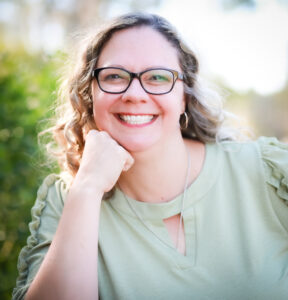 Maria Riley is a passionate Catholic author and speaker who loves volunteering or playing board games when she’s not writing or mom-ing around with her four daughters. Her award-winning Catholic children’s chapter book series,
Maria Riley is a passionate Catholic author and speaker who loves volunteering or playing board games when she’s not writing or mom-ing around with her four daughters. Her award-winning Catholic children’s chapter book series, 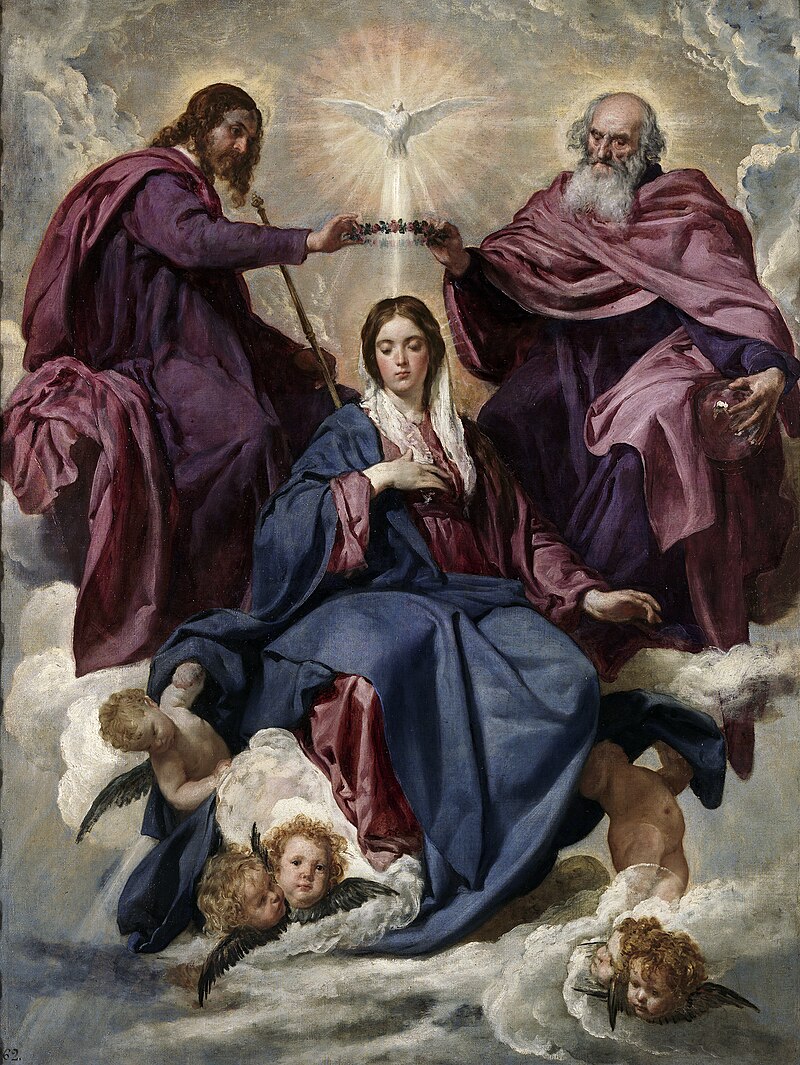
 Former NPS Park Ranger, Catholic educator, and Youth Minister, Melissa Lucca now spends her days evangelizing family and neighbors as a stay-at-home mom. She holds an MA in Theology from the Augustine Institute and pursues personal study in her spare time. Melissa loves Ignatian Spirituality, Mother Mary, and rock climbing. If you don’t hear her and her kiddo laughing at home, then they are probably out on an adventure!
Former NPS Park Ranger, Catholic educator, and Youth Minister, Melissa Lucca now spends her days evangelizing family and neighbors as a stay-at-home mom. She holds an MA in Theology from the Augustine Institute and pursues personal study in her spare time. Melissa loves Ignatian Spirituality, Mother Mary, and rock climbing. If you don’t hear her and her kiddo laughing at home, then they are probably out on an adventure!